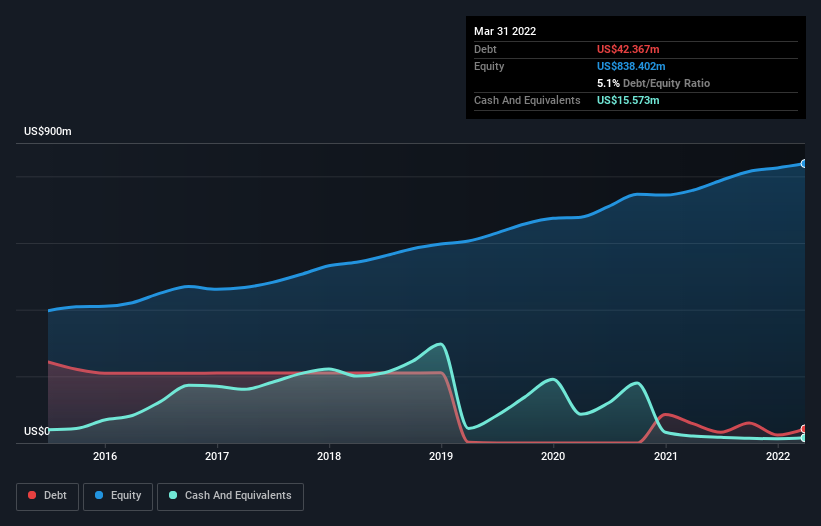- United States
- /
- Building
- /
- NasdaqGS:ROCK
Here's Why Gibraltar Industries (NASDAQ:ROCK) Can Manage Its Debt Responsibly

Howard Marks put it nicely when he said that, rather than worrying about share price volatility, 'The possibility of permanent loss is the risk I worry about... and every practical investor I know worries about.' So it seems the smart money knows that debt - which is usually involved in bankruptcies - is a very important factor, when you assess how risky a company is. We can see that Gibraltar Industries, Inc. (NASDAQ:ROCK) does use debt in its business. But should shareholders be worried about its use of debt?
When Is Debt Dangerous?
Debt assists a business until the business has trouble paying it off, either with new capital or with free cash flow. In the worst case scenario, a company can go bankrupt if it cannot pay its creditors. While that is not too common, we often do see indebted companies permanently diluting shareholders because lenders force them to raise capital at a distressed price. Of course, plenty of companies use debt to fund growth, without any negative consequences. When we examine debt levels, we first consider both cash and debt levels, together.
View our latest analysis for Gibraltar Industries
What Is Gibraltar Industries's Net Debt?
As you can see below, Gibraltar Industries had US$42.4m of debt at March 2022, down from US$58.0m a year prior. However, because it has a cash reserve of US$15.6m, its net debt is less, at about US$26.8m.

How Healthy Is Gibraltar Industries' Balance Sheet?
We can see from the most recent balance sheet that Gibraltar Industries had liabilities of US$287.7m falling due within a year, and liabilities of US$116.2m due beyond that. Offsetting these obligations, it had cash of US$15.6m as well as receivables valued at US$245.8m due within 12 months. So its liabilities total US$142.6m more than the combination of its cash and short-term receivables.
Of course, Gibraltar Industries has a market capitalization of US$1.26b, so these liabilities are probably manageable. However, we do think it is worth keeping an eye on its balance sheet strength, as it may change over time.
We use two main ratios to inform us about debt levels relative to earnings. The first is net debt divided by earnings before interest, tax, depreciation, and amortization (EBITDA), while the second is how many times its earnings before interest and tax (EBIT) covers its interest expense (or its interest cover, for short). This way, we consider both the absolute quantum of the debt, as well as the interest rates paid on it.
Gibraltar Industries has a low net debt to EBITDA ratio of only 0.18. And its EBIT covers its interest expense a whopping 71.3 times over. So we're pretty relaxed about its super-conservative use of debt. The good news is that Gibraltar Industries has increased its EBIT by 2.6% over twelve months, which should ease any concerns about debt repayment. When analysing debt levels, the balance sheet is the obvious place to start. But ultimately the future profitability of the business will decide if Gibraltar Industries can strengthen its balance sheet over time. So if you're focused on the future you can check out this free report showing analyst profit forecasts.
But our final consideration is also important, because a company cannot pay debt with paper profits; it needs cold hard cash. So we always check how much of that EBIT is translated into free cash flow. During the last three years, Gibraltar Industries produced sturdy free cash flow equating to 70% of its EBIT, about what we'd expect. This cold hard cash means it can reduce its debt when it wants to.
Our View
Happily, Gibraltar Industries's impressive interest cover implies it has the upper hand on its debt. And the good news does not stop there, as its net debt to EBITDA also supports that impression! Looking at the bigger picture, we think Gibraltar Industries's use of debt seems quite reasonable and we're not concerned about it. While debt does bring risk, when used wisely it can also bring a higher return on equity. When analysing debt levels, the balance sheet is the obvious place to start. However, not all investment risk resides within the balance sheet - far from it. Be aware that Gibraltar Industries is showing 1 warning sign in our investment analysis , you should know about...
If you're interested in investing in businesses that can grow profits without the burden of debt, then check out this free list of growing businesses that have net cash on the balance sheet.
New: Manage All Your Stock Portfolios in One Place
We've created the ultimate portfolio companion for stock investors, and it's free.
• Connect an unlimited number of Portfolios and see your total in one currency
• Be alerted to new Warning Signs or Risks via email or mobile
• Track the Fair Value of your stocks
Have feedback on this article? Concerned about the content? Get in touch with us directly. Alternatively, email editorial-team (at) simplywallst.com.
This article by Simply Wall St is general in nature. We provide commentary based on historical data and analyst forecasts only using an unbiased methodology and our articles are not intended to be financial advice. It does not constitute a recommendation to buy or sell any stock, and does not take account of your objectives, or your financial situation. We aim to bring you long-term focused analysis driven by fundamental data. Note that our analysis may not factor in the latest price-sensitive company announcements or qualitative material. Simply Wall St has no position in any stocks mentioned.
About NasdaqGS:ROCK
Gibraltar Industries
Manufactures and provides products and services for the renewable energy, residential, agtech, and infrastructure markets in the United States and internationally.
Flawless balance sheet and undervalued.


